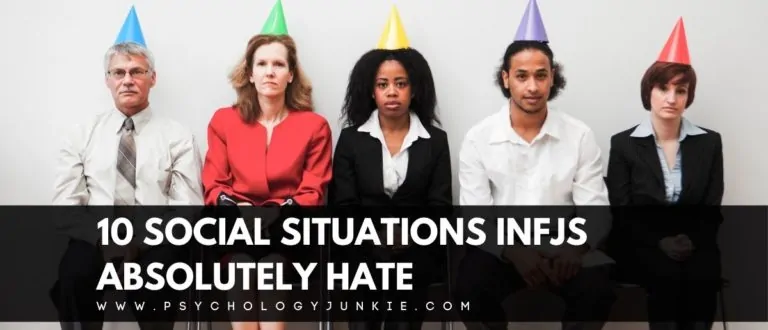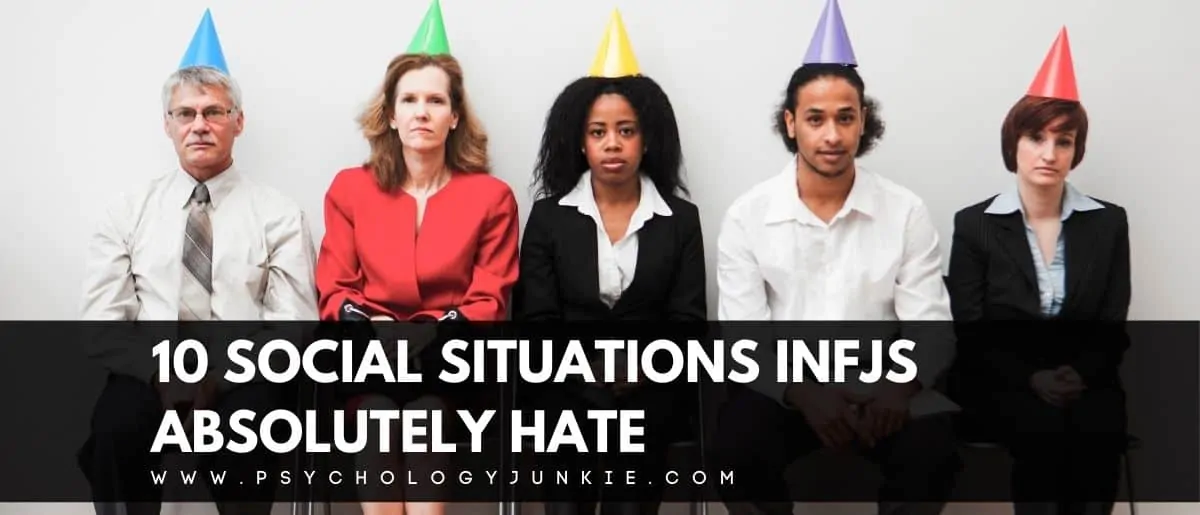Myers-Briggs® and Mental Illness – The NT Types
Do you think there’s a link between MBTI® types and certain mental illnesses? I’ve seen this question come up often in various personality type communities. For months I’ve been researching any information I could find to see if there’s a correlation between type and mental distress.
I used to have a long post detailing all the research I found about type and mental illness here, but I think at this point it might be better to leave this page alone since too many people have drawn incorrect conclusions between type and mental illness and that can be dangerous. I believe if you are suffering from a mental illness (or are afraid that you are) then talking to a professional counselor would be the best option.

Here are some other articles you might find helpful:
The Shadow Functions of the INTJ Personality Type
The Unhealthy Coping Mechanisms of Every Personality Type
If you are feeling depressed,
Text CONNECT to 741741
I will leave some sources here in case anyone is interested in checking them out:
An Empirical Investigation of Jung’s Psychological types and Personality Disorder Features – Case Study
Journal of Psychological Type
The 16 Types – web page
Nurture by Nature – Understanding Your Child’s Personality Type – And Become a Better Parent by Paul D. Tieger and Barbara Barron-Tieger
Please Understand Me II by David Kiersey














As a fellow INTJ, I would like to share some of my personal experiences regarding mental illness and my type, seeing how extensive research you did on the subject. I figure this can also be helpful for you once you become a psychologist.
I haven’t been diagnosed officially, but by myself, with Anxiety Disorder. It manifests in a way that it makes me insanely insecure — when something happens in the present, I can’t help but immediately think what the consequences are GOING TO be, and then I’m stressing on what I could do to prevent it from happening. This is NiTe stack, because it focuses on what will be (Ni) and wants to find an immediate solution (Te).
The AD can make me quite absorbed in the future, but in a negative way, because I’m always worried about it. And here comes what you mentioned regarding antisocial behaviour — when meeting a new circle of people, I’m simultaneously impatiently waiting to meet them and am frightened and scared of them. For instance, the last time I was introduced to a group, I knew it was going to happen, having discussed it with my acquaintance who’d already known them, but at the last 2-3 minutes before actually meeting the group, I nearly started hyperventilating. It almost felt like I was starting to choke on a non-existing lump in my throat.
Or another example (which I etch up to the NiSe frame): the last time I had an exam (it was First Aid), I knew everything, and not only because I read the book we had been given by our teacher, but because I’d already passed a Biology exam, hence I pretty much knew the whole curriculum beforehand. (Also after having passed the Biology exam, I kept reading up on the human body just because it interests me.) Anyway, the reason I mentioned that I’m blaming the manifestation of my AD on my inferior Se is that before the exam, I skimmed through my notes over and over again, and other people had to nudge me and point out to me that whilst reading, I was unconsciously chewing on my lip and it ended up bloody. And just then did I taste the blood on my tongue.
If you asked me whether I’ve had a panic attack in my life, I would have to tell you, with all honesty, that I have no idea. Even if I did experience it before, I don’t know about it, or just failed to acknowledge it and rationalize it as one of those attacks. However, I can’t imagine I’ve never had one with his level of stress in my life. I have no idea if minor panic attacks exist or not, but if they do, then I do have a tendency to get them on a regular basis, because I dwell on everything that’s still part of the future and not the past. The term ‘everything’ pretty much encompasses LITERALLY EVERYTHING you can imagine — sitting in class, insecure whether there will be a surprise test or not, paying at the cashier, etc.
So yes, my AD makes me socially awkward and antisocial. I can’t seem to fully relax even in the company of close friends, because a small amount of anxiety is always in me.
Because of the AD, I tend to have very serious stomach aches, too.
Thank you so much for your insight on this! I really appreciate it. I have hoped and hoped that I could get some firsthand thoughts on how different types relate to these issues. I can see how the Ni-Te process could create that anxiety. For me, as an INFJ, I have the Ni-Fe problem – I see a potential problem for someone in my family, or a relationship, and I want to fix it now. I want everyone to be ‘good’ and happy all the time, and it creates a lot of anxiety. I can also predict when something bad could happen to someone, and if they don’t take me seriously then it’s very frustrating.
I am sorry that you struggle with anxiety, that is not an easy thing to deal with and I know from experience that it can make your life incredibly stressful and overwhelming. I do believe that people can have minor panic attacks. As someone who’s struggled with PTSD for many years I’ve been able to experience pretty intense panic attacks (being unable to breathe, shaking, trembling, throwing up, etc,..) and more minor ones (heart racing, lump in my throat, bowling ball in my stomach, jittery feeling). It sounds to me like you’ve had panic attacks related to your anxiety. Have you found any ways to be able to combat those panic attacks? This is something I am trying to work on myself as well, because I struggle with it myself. This is why I’ve tried to research MBTI and stress reduction techniques for each type, and I have a post on it here somewhere.
You’re very welcome! I know first-hand that it feels nice to get feedback from your readers.
(I forgot to mention that I have a high tendency for insomnia, too.)
As for dealing with the panic attacks: I didn’t acknowledge any of those as (minor) panic attacks, however, I tried deliberately not to let myself stress over menial things with the extent I do, with not too much success whatsoever. I haven’t figured out a method to eliminate these symptoms of the AD/PD once and for all, but one thing I know for sure is that I will not visit a psychologist just because of this; it has a steep price, and with all of the other things I’m currently working on, I can’t afford that. Besides, I’ve already set up my diagnosis, hence I won’t need someone else pointing it out to me once more — I wouldn’t need that psychologist to point out the obvious to me, but for him/her to advise me how to fight against it.
The whole tour to mental health would require many and much more visits, but a lot of visits mean a lot of money too, and right now I’m not intend to throw my money away (because now I would consider that as throwing my money away).
Anyway, the best method I’ve found so far was to face the root of the not-really-a-problem problem, because once the source is eliminated, my breathing and heart settles and switches back to sinus rhythm. (But I DO understand it’s an extremely hard thing to do, because while it’s as easy for other people as child’s play, it’s as hard for me as deciding to try to take a pack of undead down.) For instance, fighting against being afraid of being introduced is best solved by immediately approaching the group and getting over with it as soon as possible.
Basically, just go straight for the kill.
Hi panic and anxiety thrive on our fear of it our avoidence , the best way to combat is to welcome it I know that his hard and this way takes time but I promise you it will work , we have an alarm system in our head and it’s quite old but still useful if a car was heading our way fast our alarm would make us get out of the way fast useful ! , but the problem is our alarm system is a bit thick it’s like a smoke alarm doesn’t know the difference between burnt toast or real fire it will go off regardless , same with our alarm system it will react to our thought s and fears the same as the speeding car it doesn’t know our thought are just thoughts harmless ! It things we are in danger ence why we feel panic , but this is where we have the chance to give it new information to say no there is no danger I will not leave here I will stay and know that nothing bad will happen yes your alarm will go off and it will be noisy and dam irritating but in the end it will get the message , if we keep telling our alarm we are in danger it will stay on if we say I don’t care I know there is no danger bring it on our alarm will still go off but in the end it will get the message and stay off permanently , coming on only when needed , we all need our survival no one needs fear , and like the great jiddu krishnamurti said fear is thought survival is intelligence , important to remember! I’ve known lots of people that have struggled with panic and anxiety scared of having a heart attack scared of passing out going mad becoming evil scared of dying choking so on and so on and struggled for many years and guess what no one has had any of these things happen our imagination is powerful it can make us think all sorts of rubbish and our alarm system like I said is thick it will react and believe anything , when it goes off tell it its just burnt toast and shut the hell up , remember fear is false survival is wise .
Thank you for writing about this. I have wondered about the connection between mental illness and personality type. The experts used to classify introversion as a symptom of mental illness. We now know that isn’t true. I have Major Depressive Disorder and Social Anxiety. I believe that mental illness is a product of both nature and nurture. That being said, I read that if German Shepherds are not provided with enough physical and mental stimulation, they become neurotic and destructive. As an INTJ, I think I am like a German Shepherd. When I am being challenged at work, when I feel like I am solving problems and I get a sense of fulfillment, my depression recedes. I always need to be learning something new and if I can’t apply it, I become frustrated.
I thought I would add my two cents. I am fascinated by human behavior as well.
Thanks so much for your feedback! I really appreciate it. As an INFJ I can very much relate to what you’re saying. I think INFJs and INTJs both being Ni-dominant/Se-inferior, we both tend to want to put all our time to good use and be intellectually stimulated. I know for me I get very depressed if I feel that I am not learning something new, or challenging myself in any way. I am sorry that you are dealing with depressive disorder and social anxiety. Those are not easy issues to live with. I hope you are getting some help, and if you ever want to talk about it let me know. I think the kinds of solutions that work for different types will vary, so I’m very interested in finding out different techniques for dealing with depression and anxiety that would be unique to each type. Thanks again for your thoughts, I’d love to hear more of your thoughts as I post in the future!
It’s so interesting and helpful to read of similar experiences– as an INTJ I have been finding myself with a lot more anxious or depressive mood swings in the last year or two, all of which I am starting to find may be related to the lack of productive, fulfilling work I do at my job. I have been compensating by taking plenty of vacations and trips, socializing and growing my group of close friends (which is also constantly up and down in terms of perceived success leading to a lot of letdowns from people I thought were close), and on my outdoor and exercise hobbies (Se development). I’ve generally been enjoying having a lot of free time on my hands, but find that after a short while I begin feel lonely, aimless, and distracted by thoughts that make me depressed and lose confidence. My self-esteem is very closely tied to my productivity levels and sense of fulfillment and at least some acknowledgment of my talent and my contribution to a worthwhile goal.
My fear of finding a new job that takes away the flexibility and freedom I currently enjoy has been holding me back to an extent, unfortunately. But identifying a possible source of my insecurities helps give me the push I need to move forward!
Thank you so much for your thoughts. It is definitely very difficult to balance the desire for productivity (a very strong drive for INTJs) with the desire for peace and free time. I’m glad you’ve been able to get some time to travel, get outdoors, and form some positive relationships! That’s awesome! I can definitely understand that it would be a little stressful thinking about a new job and being more tied down – I hope you are able to find something very fulfilling that utilizes your passion and interests – something that doesn’t feel like work! That would be great. I wish you the very best of luck!!
ENTJs have a huge tendency to have Narcissitic Personality Disorder. Based on my first hand experience, Im an INFJ daughter of an ENTJ narcissistic father. Would be an interesting article to read if you can find stuff about it 🙂
ENTP here. I’ve lived with anxiety in some form or other for the best part of 20 years. I also have trichotillomania – I pull my hair out as a means of coping with stress. Earlier this year my job was redefined for the 4th time in 6 years, and that sent me into a whirl of stress and panic attacks. There’s a lot of stuff about ENTPs thriving on change – it’s more complex than that. Having the freedom to instigate constructive change – absolutely yes. Being pushed into arbitrary change where the new system is illogical, bureaucratic and flawed – hell no. All the bits of my job that I find rewarding have been taken off me – so after a few weeks signed off with anxiety, I went looking for a new job that would play to my strengths, found one, got it, and resigned from the current one. Actions speak louder than words (and I was already bellowing at the top of my lungs that they’d made a mistake).
“Female INTPs in particular often don’t fit into the typical “female” role. In Nurture by Nature, authors Paul D. Tieger and Barbara Barron-Tieger say that “Like other strong Thinking types, some INTP girls find themselves even more socially ill at ease than others their age because they are not interested in or adept at conforming to the socially expected “female” behavior and dress of their peers.”
This! So much! As an INTP female, it has taken many years for me to simply understand that I am not “odd”; rather, I’m “rare.” Everything listed under the INTP section rings true for me: the hoarding, the avoidance, the eccentricity, etc. But I’m glad that now in adulthood I’ve been able to understand myself better which in turn enables others to understand me. I guess we are all a work in progress when it comes to self-realization and actualization.
Great blog, by the way! Your posts are really interesting and well-informed. I’m now a subscriber. 🙂
I understand your assessment of INTPs but I think the assumptions about wanting to be “liked” are completely wrong. “Like” isn’t really a thing, at least, not for me. I don’t want to be “liked” and I think that’s considered an outright sin, in this society. People expect each other to want to be liked and accepted by them and when someone doesn’t, they don’t know what to do.
I do, sometimes, wish there were places I could go and people I could “play” with without worrying about flipping the switch on somebody’s defenses. I wish there were more fearless people to play with.
On the other hand, if it weren’t for the fears and defensiveness of others, I seriously doubt I’d be an introvert or have ever experienced the thrill of “thought without limit”. There’s no speed limit in my head – I can go as fast and as far as I like and I LOVE that. Would I trade that for more comfortable, less stressful interaction with others? Hmmm…interesting question…the answer is no. Actually, it’s not just “no”, but “hell no”. What goes on in my head is my sanity and anyone who wants or expects me to give that up so that they don’t get their feelings hurt is barking up the wrong tree. My message to them is “I’m never going to be what you want me to be so any attention you give to and demand FROM me is going to be a complete and utter waste of time. You can do as you please, but I’m not going there.”.
If people could treat those they don’t like as if they were their least favorite restaurant – i.e. walk on by on their way to something “better”, in their own estimation – it would make for a much less hostile environment which brings us to something you probably have exactly right, which is PTSD. INTPs are traumatized. Living in a social/political world where one is perceived as “unacceptable” is traumatic. Most will think and grow themselves out of the trauma, but it’s always there, in the back of one’s mind: “At this place, at this time, you are likely to be perceived as less than acceptable, at best. Don’t worry about it – just watch your step and avoid eye contact and you’ll be fine.”.
Thanks so much for reading my post and sharing your thoughts. I really appreciate it. I will have to re-read this post as it’s been a while since I wrote it and then see if I need to change it at all based on the information you’re giving me. It was extremely difficult to write a post on mental illness and personality type simply because there was SO little research done on the subject – so everything is just opinion and could very likely be off. I have a few INTP friends and an INTP family member, and I agree that they are very limitless in their thinking, and wouldn’t trade that for anything. It’s something I really admire about them 🙂 I am really frustrated that INTPs deal with so much pushiness by others to change or to “fit in” to a world that is, by far, oriented in a different way. I am sorry that many INTPs are perceived as “unacceptable” as you said, and have to deal with repercussions like PTSD as a result. Thank you again for sharing your experience and thoughts with me. I really appreciate it.
This article is based on fallacy, though a fairly logical one. While I appreciate your efforts, …”occam’s chainsaw,” among others, is a poor example of an INTJ, and quite frankly, suffers only from a “victim” mentality, aka being a little bitch. 😉 There isn’t a corrolation between mental disorders and personality types. There are so many parents and pschyiatrists misdiagnosing there kids with ADHD, autism, etc. simply because the subject doesn’t fit the picture perfect image of a traditional society member. Some children do have deficits. Others have more energy than others and find traditional ways of doing things to be stupid, boring, or illogical. It doesn’t mean they’re mentally handicapped, it means they’re unique, or possibly more competent…but what happens when you put a bunch of crabs in a barrel? They pull each other down.
I thought this was a good article.
Thank you! I hope it was helpful!
Found your site since I was curious if my personality type (INTJ) could have anything to do with mental illness, as I feel that smart people often suffer from depression. I have had depression since I was 13, and the last few years I’ve developed social / anxiety. Actually starting new treatment in a few hours!
I’m so sorry that you’ve had to struggle with depression and anxiety. That cannot be easy, and I really hope the new treatment help. Thank you for visiting my site and I wish you the best of luck. I know how hard it is to live with anxiety.
I found this article very helpful and logically organized. As I’ve only learned about the Myers Briggs/ Jung theory, Ive began looking for articles like these. I wonder if personalities are more likely to change after a treatment for a certain mental disorder. Personally, as an INTP, I found this article very helpful so thank you
I’m glad you enjoyed the article and found it helpful! Thank you for your feedback. I don’t know if types can change after a treatment for a mental disorder. I don’t think the ingrained, natural type changes, but the realized type might. For example, someone who is experiencing PTSD might type as ISTJ because of their feeling “caught” in past traumas and unable to access their emotions easily, but upon healing and treatment may identify more accurately as INFP.
Thank you for the article. It enjoyed the read and the topic is one that I have also been arguing for quite some time now. People should find this much more troubling then they do. Seems a very dangerous thing to have ” abnormal behaviors” that are used to diagnose mental illness so closely resembling the normal personality traits of certain personality types just because those types don’t make up the majority. I’m an INTP female and was told I have Aspergers. Upon investigation I decided that I apparently do. I’m pretty sure mild Aspergers and the INTP personality are one in the same. I am in no way saying Aspergers or any Autism spectrum disorder isnt a very real and serious situation. However, somehow, the INTP traits not only are almost the the exact same behaviors needed to receive the diagnosis but because of this, those personality traits are considered an illness and are to be considered not acceptable as normal. My daughter is also INTP. It disturbs me to think that had I not been INTP, and not done the studying I had , that we may have treated her like she wasn’t normal and medicated her and forever jade her thoughts about herself by labeling her with such a mental illness. Thank you for sharing and spreading the word. Mental illness is a very real thing and should be taken very seriously. I think maybe the definition of mental illness should have less to do with behaviors that aren’t social norms and more to with behaviors that are damaging to oneself and/or others.
There are INTP aspergers but also I have found some INFP ones.
Hello! ENTP here! I’ve been diagnosed with adhd, major depressive disorder and general anxiety disorder. As far as the manipulation thing goes, I can understand why there may be a correlation. I myself am not manipulative (hopefully), but since ENTPs are so fluid in their ability to empathize with people and understand all sides, I can see how some take the extra step to use that to their advantage.
Hey! Great job! I’m going to church or your link for the personality disorders for ENTP. I always try to time petty ways to increase my ego and can relate to some personality disorders, but that’s because I have schizophrenia. Please don’t judge, I’m on stable medication. Anyway, always just my busy thoughts wondering about possibilities is all.
I’m an INTP and I have borderline personality disorder
As someone who relates to INTJ and have gone through anxiety and depression , it’s ugly and took time to really beat them off. I spent years to heal myself and went for counselling once, it was mainly due to work that I don’t enjoy for 3 years and living alone overseas. I didn’t realize ‘the grip (since I just found about this web) so my sensing function was used in negative ways, excess cleaning habit, organized things ,impulsive buying to the point I developed gastritis and fainting.
As a process i lost 8kgs in 2mths and had to spent my days sleeping, feeling excessive tiredness.
It took abt 2 years by focusing on ‘awareness’ and doing things that contribute to positive ‘sensing function like painting or doing yoga.
So to others who is going through difficult time, don’t give up, take your time and travel or do what you enjoy more.
Do you think it is possible to be misdiagnosed with Asperger’s, if you’re actually just a sensitive, somewhat socially reclusive, INFJ whose Sensing family is constantly trying to fit into a Sensor mold? I feel like it causes me to use my Inferior Se–a LOT–and as a result I seem more impulsive and “childlike”. I’ve been told I have “no common sense” many times before, and my parents–ISTJ and ISFP respectively–are uninterested in hearing much of my theories on this. Trying to do more research, and was hoping someone could help?
1., I was wondering if it was scientifically plausible to misdiagnose an iNtuitive with autism?
2., Secondly, is it plausible many iNtuitives possess autism? (Thinking Sheldon Cooper and Dr. Temperance Brennan, here)
I’m an INFJ and i recently discovered that a lot of my friends from eating disorder treatment who struggled with anorexia were also INFJ’s… just thought I’d share 🙂
I am an INFJ and I’ve been diagnosed with Social Anxiety Disorder.
My mom is a BFFB and suffers from Narcissistic Borderline Personality Disorder. Actually she’s an ESTJ I believe and I noticed other family members flall into this with mental health issues, but also I see the I,s with social anxiety. I’m an ENFJ which makes up 2% of the population so I pretty much am the glue that holds people that care together. The rest can’t be fixed.
You have to look up the good and evil version of each of the 16 MB types to understand why some are more manipulative or deceitful than others and the lights will go off. I always wondered why my mom reminded me of the Queen of hearts, Rapunzel’s kidnapper and Cinderella’s stepmother. They are all ESTJ characters. Disney never made an ENFJ princess. I guess I’m my own princess. :).
I’m intp female ,I struggled since I’m very little with anxiety, social phobia , panic attacks and depression. I went from one crazy phase to the next not knowing what’s wrong with me. I started getting panic attacks around ppl at age 12 at age 16 I dropped out of school and was weeks in bed and depressed. Then got into a abusive marriage which lasted ten yrs had two kids until I finally got educated about mental illnesses and personality my life turned around in An amazing way and now I’m learning alot and in the near future I want to help others gain awareness.